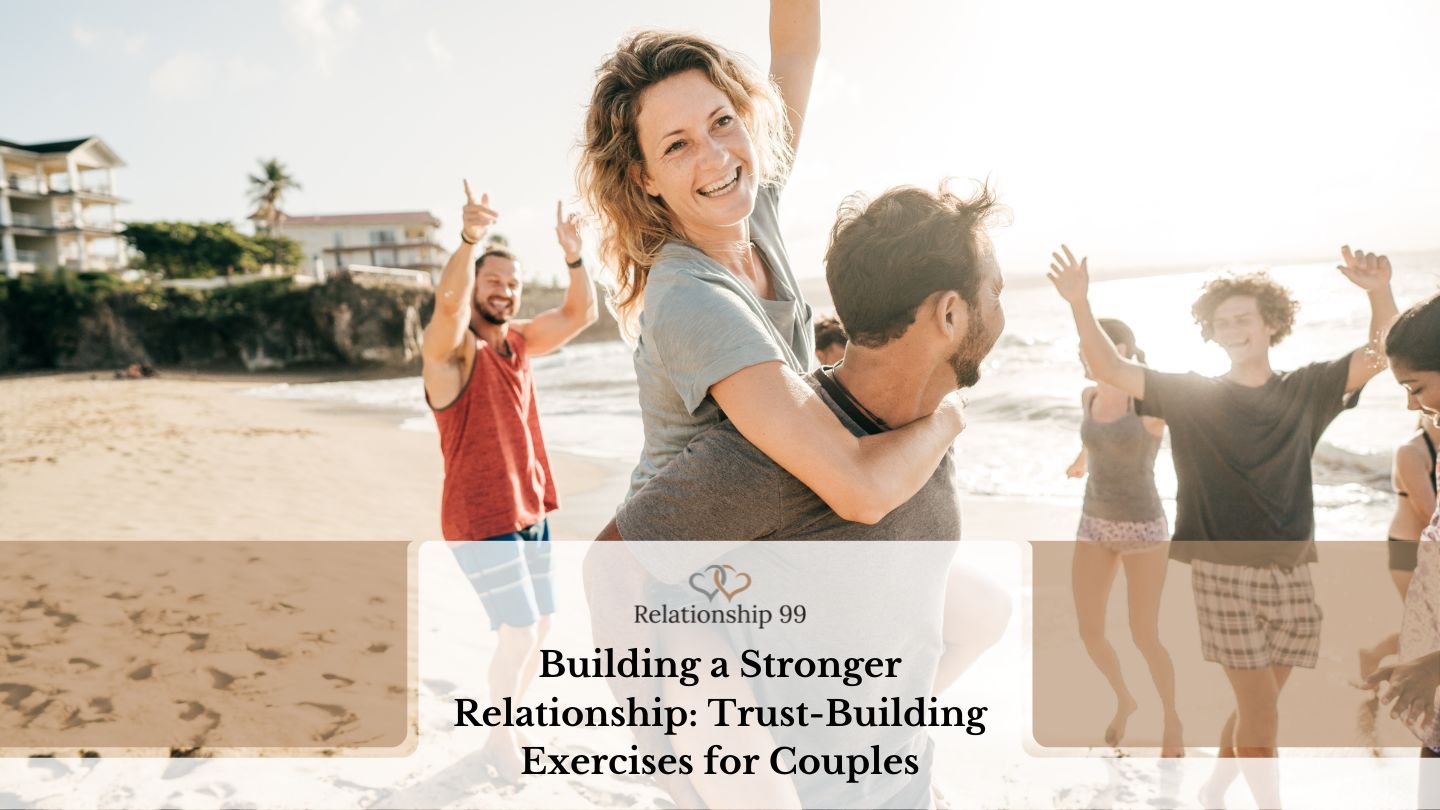Trust is a fundamental aspect of any healthy and successful relationship. It serves as the foundation upon which a strong and lasting bond can be built. Trust allows individuals to feel safe, secure, and supported in their relationship, knowing that they can rely on their partner to be honest, loyal, and respectful. Trust-building exercises for couples are designed to strengthen this foundation and enhance the level of trust between partners. By engaging in these exercises, couples can deepen their connection, improve communication, and foster a sense of intimacy and understanding.
The Importance of Trust in a Relationship
Trust plays a crucial role in the overall health and success of a relationship. It is the glue that holds couples together, allowing them to feel secure and confident in their partnership. When trust is present, individuals feel comfortable being vulnerable and open with their partner, knowing that they will be met with understanding and support. Trust also creates a sense of safety within the relationship, enabling couples to take risks, express their needs and desires, and work through conflicts in a constructive manner.
On the other hand, a lack of trust can be incredibly damaging to a relationship. Without trust, individuals may feel insecure, anxious, and uncertain about the future of their partnership. This can lead to feelings of resentment, jealousy, and suspicion, which can erode the foundation of the relationship over time. Lack of trust can also hinder effective communication and prevent couples from fully connecting with one another on an emotional level.

Understanding the Different Types of Trust
Trust can manifest in various forms within a relationship. Emotional trust refers to the belief that one’s partner will be there for them emotionally, providing support, empathy, and understanding. This type of trust allows individuals to share their deepest thoughts, fears, and desires without fear of judgment or rejection.
Physical trust involves feeling safe and secure in one’s physical interactions with their partner. It encompasses aspects such as feeling comfortable with physical intimacy, knowing that boundaries will be respected, and feeling confident that one’s partner will not engage in behaviors that could harm them physically.
Financial trust is another important aspect of trust in a relationship. It involves having confidence in one’s partner’s ability to manage money responsibly, make sound financial decisions, and be honest and transparent about financial matters.
Each type of trust is essential in a relationship, and the presence or absence of any one type can significantly impact the overall level of trust between partners.
Common Trust Issues in Relationships
Trust issues are common in many relationships and can arise from a variety of factors. Jealousy is a common trust issue that can stem from feelings of insecurity or fear of being replaced or abandoned. Infidelity is another significant trust issue that can cause immense pain and damage to a relationship. Other trust issues may include dishonesty, lack of communication, or broken promises.
Addressing and resolving trust issues requires open and honest communication between partners. It is essential to identify the root causes of the trust issues and work together to find solutions. This may involve seeking professional help, such as couples therapy, to navigate through the challenges and rebuild trust.
Communication: The Key to Building Trust
Effective communication is vital in building trust within a relationship. It allows partners to express their needs, concerns, and desires openly and honestly. By actively listening to one another and validating each other’s feelings, couples can create an environment of trust and understanding.
To improve communication in a relationship, it is important to practice active listening. This involves giving your partner your full attention, maintaining eye contact, and responding with empathy and understanding. It is also crucial to be open and honest in your communication, expressing your thoughts and feelings authentically while also being respectful of your partner’s perspective.
Regular check-ins and conversations about the state of the relationship can also help build trust. By discussing any concerns or issues openly and honestly, couples can address potential trust issues before they escalate.

Trust-Building Exercises for Couples to Try
There are several trust-building exercises that couples can try to strengthen their bond and enhance the level of trust between them. One exercise is sharing secrets. This involves each partner sharing something personal or vulnerable with the other, creating a sense of intimacy and deepening the level of trust.
Another exercise is practicing active listening. This involves taking turns speaking and listening without interruption or judgment. By actively listening to one another, couples can foster a sense of trust and understanding.
Trust falls are another popular exercise that can help build trust between partners. In this exercise, one partner stands with their eyes closed while the other partner stands behind them and catches them as they fall backward. This exercise requires a high level of trust and can help couples build confidence in one another.
Building Trust through Vulnerability and Honesty
Vulnerability and honesty are key components of building trust in a relationship. Being vulnerable means allowing yourself to be open and honest about your thoughts, feelings, and fears, even if it feels uncomfortable or scary. By being vulnerable with your partner, you are showing them that you trust them enough to share your deepest self.
Honesty is also crucial in building trust. It involves being truthful and transparent in your words and actions, even when it may be difficult or uncomfortable. Honesty builds trust because it shows your partner that they can rely on you to be truthful and trustworthy.
To practice vulnerability and honesty in a relationship, it is important to create a safe space where both partners feel comfortable expressing themselves without fear of judgment or rejection. This can be achieved through open communication, active listening, and a commitment to understanding and supporting one another.
Rebuilding Trust after a Betrayal
Rebuilding trust after a betrayal, such as infidelity, can be challenging but not impossible. It requires both partners to be committed to the process and willing to put in the necessary work to rebuild trust.
One crucial step in rebuilding trust is for the partner who betrayed the trust to take responsibility for their actions and show genuine remorse. This may involve apologizing, making amends, and demonstrating through their words and actions that they are committed to change.
The betrayed partner also plays a role in rebuilding trust by being open to forgiveness and allowing themselves to heal. This may involve seeking support from a therapist or counselor, setting boundaries, and engaging in open and honest communication with their partner.
Rebuilding trust takes time, patience, and consistent effort from both partners. It requires a willingness to be vulnerable, honest, and transparent with one another as you work through the pain and rebuild the foundation of your relationship.
The Role of Forgiveness in Trust-Building
Forgiveness is a crucial component of building and maintaining trust in a relationship. It involves letting go of resentment, anger, and hurt and choosing to move forward with love and understanding. Forgiveness allows couples to heal from past hurts and create a new foundation of trust.
Forgiveness does not mean forgetting or condoning the actions that caused the hurt. Instead, it involves acknowledging the pain, understanding the reasons behind the actions, and choosing to let go of the negative emotions associated with the betrayal.
Forgiveness can help strengthen a relationship by allowing couples to rebuild trust and create a deeper level of intimacy. It requires both partners to be committed to the process and willing to work through any lingering issues or concerns that may arise.

Maintaining Trust in a Long-Distance Relationship
Maintaining trust in a long-distance relationship can be challenging due to the physical distance between partners. However, with open communication, honesty, and commitment, trust can still be built and maintained.
Regular communication is essential in a long-distance relationship. This can include phone calls, video chats, and text messages. By staying connected and sharing your thoughts and feelings with one another, you can build a sense of trust and intimacy.
It is also important to be honest and transparent about your actions and intentions. This includes being open about your social activities, friendships, and any potential challenges or concerns that may arise.
Building trust in a long-distance relationship requires both partners to be committed to the relationship and willing to put in the effort to maintain open lines of communication and foster a sense of trust and security.
The Benefits of Trust-Building Exercises for Couples
Trust-building exercises for couples can have numerous benefits for a relationship. By engaging in these exercises, couples can deepen their connection, improve communication, and foster a sense of intimacy and understanding. Trust-building exercises can also help couples address and resolve trust issues, rebuild trust after a betrayal, and maintain trust in long-distance relationships.
Trust is a fundamental aspect of any healthy and successful relationship. It allows individuals to feel safe, secure, and supported in their partnership. By prioritizing trust-building exercises and actively working to build and maintain trust, couples can create a strong foundation for a lasting and fulfilling relationship. So why not give these exercises a try? Your relationship will thank you for it.

